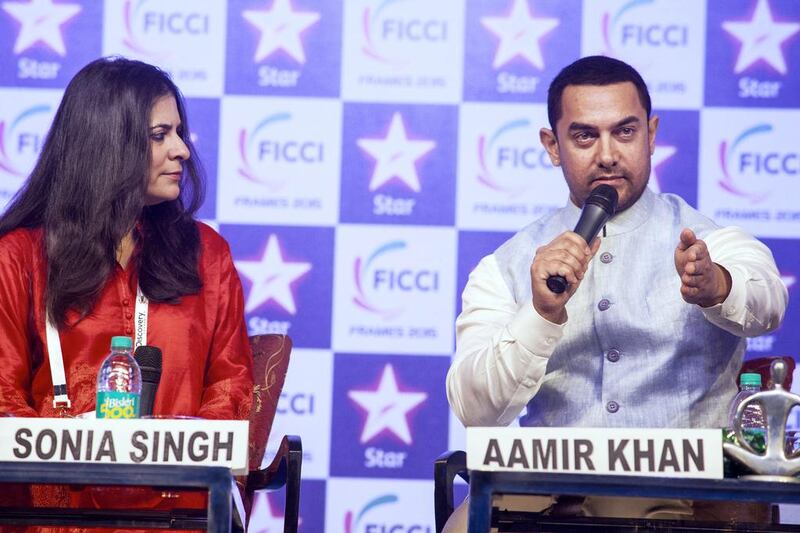The Bollywood stars Aamir Khan, Abhishek Bachchan and Kamal Haasan gathered alongside top executives from India’s entertainment industry at a conference in Mumbai last week to discuss the sector.
The theme of the three-day conference focused on how to transform India into a global entertainment superpower.
The consensus was that India could grow its entertainment business to become an even bigger contributor to the economy and play a bigger role globally with the right efforts by the industry and state and federal governments.
“Though there is a large amount of work happening, there is still untapped potential in developing these services,” said Jyotsna Suri, the president of the Federation of Indian Chambers of Commerce and Industry (Ficci), which organised the Ficci-Frames conference.
“I see no reason why India should not become a global entertainment superpower. Our country has a vast wealth of spectacular terrain and it is important that we explore all locations for shooting.
“This, dovetailed with affordable world-class production amenities, including VFX, 3D and animation, can make India a one-stop shop for film production. We also have well-equipped film cities across the country like Mumbai, Hyderabad, Chennai, and Noida.”
India’s media and entertainment industry grew by 11.7 per cent to 1.02 trillion rupees (Dh59.64 billion) last year from 918bn rupees a year earlier, according to a report by KPMG and Ficci published last week.
It is expected to grow by 13.9 per cent annually to reach 1.96tn rupees by 2019, a growth rate that is close to double that of the global industry.
The report said to become a global entertainment superpower, the government needed to ensure measures were in place to facilitate speeding up permissions for film shoots and clearances for building more multiplex cinemas.
The industry should concentrate on creating the right content for the audience, as well as having advanced digital strategies in place for easier access, it added.
Television actually contributed the biggest share to India’s media and entertainment revenues, accounting for almost half of total earnings in 2014. Print was in second place, contributing 263.4bn rupees last year.
Despite all the glamour and frenzy that surrounds Bollywood, films were in third place, at 126.4bn rupees.
India’s film sector only grew by 0.9 per cent last year over the previous year.
“I think it’s time for the film industry to take stock and evaluate its business model,” said Jehil Thakkar, the leader of the entertainment practice at KPMG in India.
“Domestic theatricals were flat, largely because multiplex additions slowed down somewhat. Talent costs have gone crazy. Really some of the core issues need to be addressed.”
He pointed out that China’s box office revenues had overtaken those of India.
“Just six years ago India was a bigger market than China,” Mr Thakkar said.
“In terms of multiplex expansion, China is adding 18 screens a day, while India is adding 150 screens a year.
“So lots needs to change on the ground if India is to become that superpower,” he said. “They add more screens in 10 days than we do in a year.”
Radio, digital advertising, gaming and animation were all segments of the industry that rose strongly in India last year in terms of revenues.
Kamal Haasan, an actor and producer in India, said it was all too easy to look at the numbers for the entertainment industry and “lean back”. “No empire, however big it is, can afford this complacency,” he said.
“It’s a very strange industry where it is driven by content. They might say that the automobile industry is also like that. Not so.
“You can rest for five years. But you can’t rest for five minutes in this industry, especially the television industry.
“And we have come to a stage where the platforms have been merging. My industry now, I think, includes the television and the cell phone.
“Before, I used to be so small-minded and thought I belonged to the film industry. I belong to the moving images industry now in this digital world.”
Aamir Khan, a popular Bollywood actor, said the issues that worried him and were holding back the sector included censorship.
“I’m totally against banning any kind of material,” he said. He referred to the Kamal Haasan 2013 film, Vishwaroopam, which was banned in the state of Tamil Nadu because of religious sensitivities.
“Once a film has received a certification, then it is the responsibility of the state to ensure that people can watch the film without any fear,” Mr Khan said.
Harit Nagpal, the chief executive and managing director of Tata Sky, one of India’s major satellite television providers, said India needed to do much more to develop its entertainment industry.
“If it hasn’t moved from being one of the top 15 [media and entertainment countries] to being a superpower in the last five years, then how will it move to become a superpower over the next 15 years, if we continue to do the same things we’ve been doing over the last five years?”
He expressed disappointment at what he described as “a lack of new thinking”, referring to a dearth of original content on television in India.
“I could blame it on lack of experimentation by the producers but I am told when I speak to these producers that the economics of the business, the restrictions and the permission they have to get, do not provoke them to take risks, so they choose the safe and successful path which often leads to failure,” Mr Nagpal said.
The entertainment industry in India was about far more than “power and propaganda and glamour”, he added.
“This industry is like any other industry. It’s created to benefit its users, it’s created to generate employment, it’s created to drive the economy.”
At a government level, he said things had improved over the past few months in terms of securing clearances more quickly.
But it would be better if there was no need to seek such approvals at all, he added.
“I am still awaiting an approval for a 250 crore [crore = 10 million] rupee investment into my company for which the money has already come and if the approval does not come in the next 48 hours, I will have no choice but to return that 250 crores back to the investors sitting outside the country.
“It’s a small amount for the country, but it’s these small, small, small approvals that pile up and force us not to do our job that we are supposed to do.”
JS Mathur, the additional secretary of the Indian government’s ministry of information and broadcasting, agreed there were challenges the government had to meet to help to boost the industry.
“There are issues of content diversification and also of newer business and revenue models,” Mr Mathur said.
“These are exciting times and exciting times always come with challenges.”
business@thenational.ae
Follow The National's Business section on Twitter





